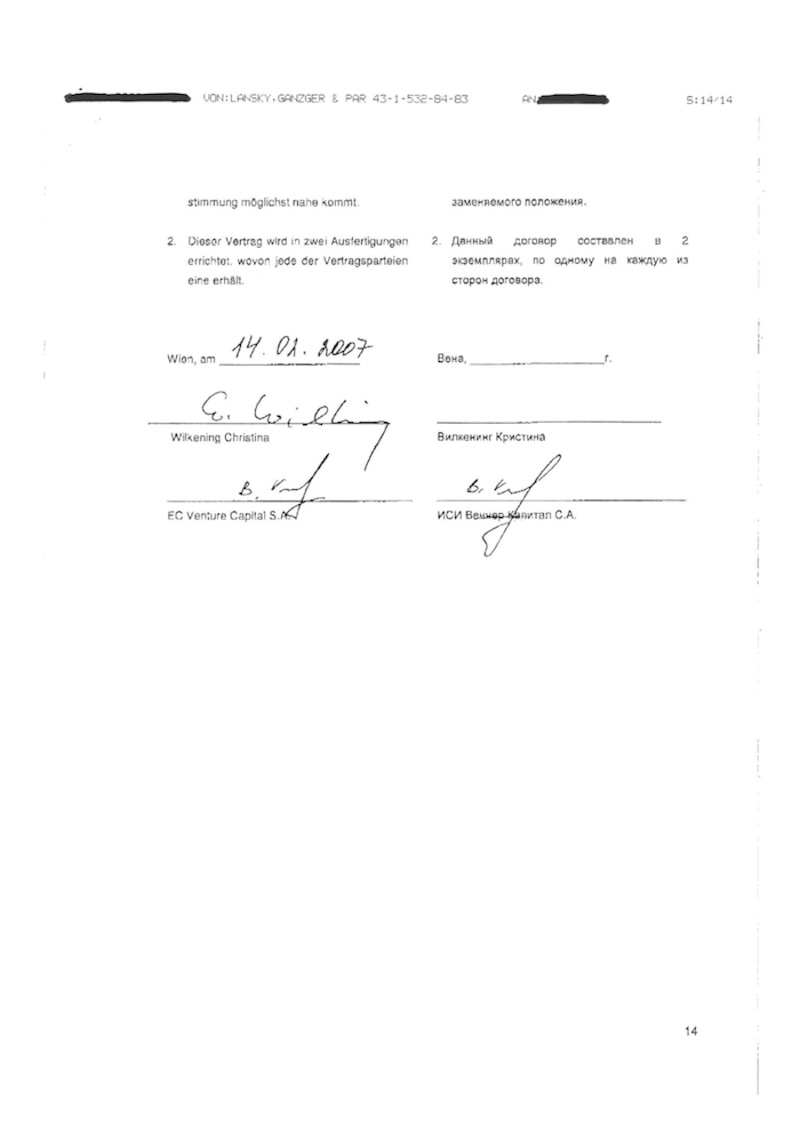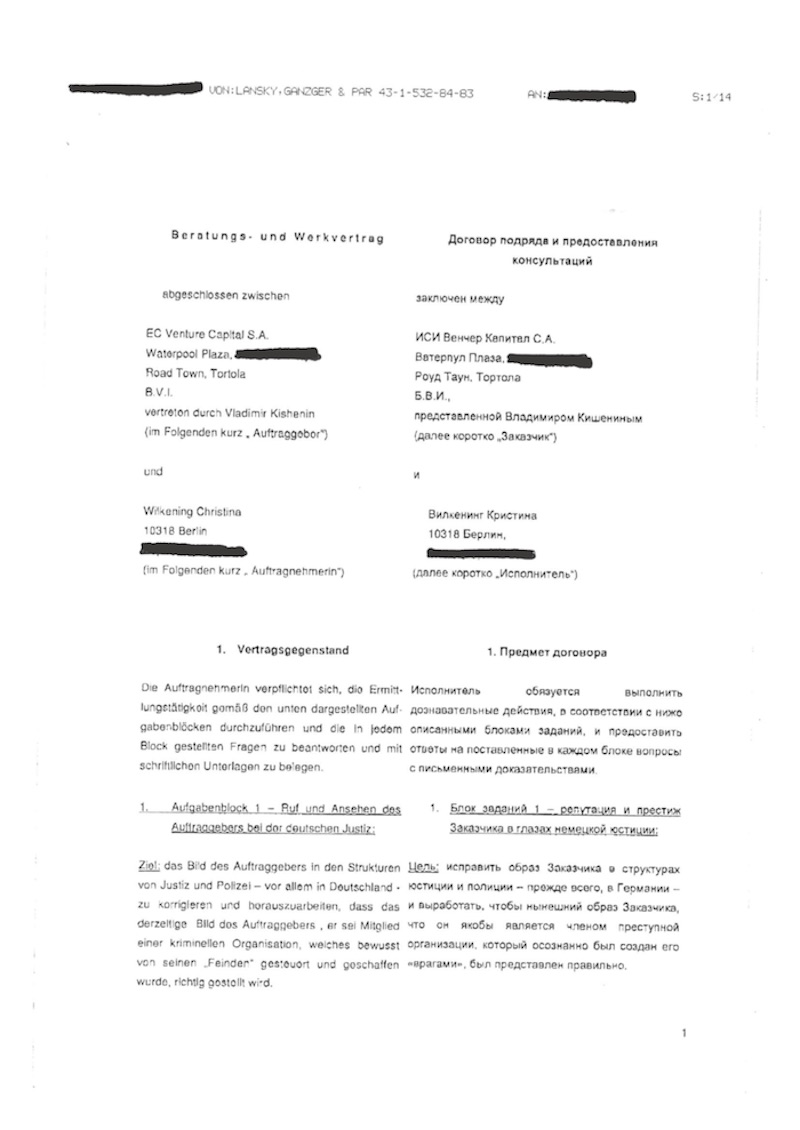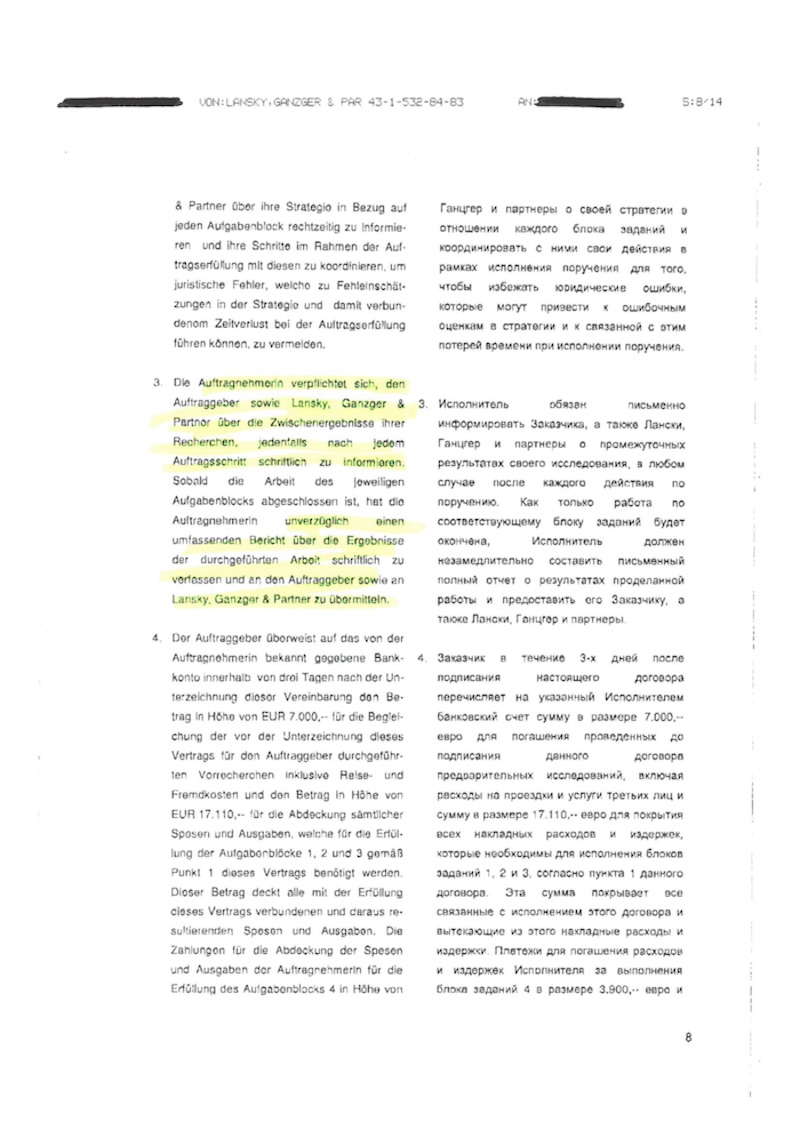Get the weekly SPARTANAT newsletter.
Your bonus: the free E-Book from SPARTANAT.

SPIONAGE (5): The agent, the Russian politician and his lawyer
German private agent Christina Wilkening was hired to assist Russian politician Vladimir Kishenin in resolving financial issues due to being linked to a criminal organization with frozen assets. Wilkening's involvement in potential bribery is investigated in this intelligence exposé by ADDENDUM.
The German private agent Christina Wilkening was supposed to assist the then party leader Vladimir Kishenin in solving very special problems: Kishenin was actually considered by authorities in Germany and Austria as a member of a criminal organization, and 170 million dollars were frozen. In coordination with the well-known Viennese law firm Lansky, Wilkening was supposed to contact officials from Munich to Moscow. Now documents have emerged that show the agent had apparently planned to use bribery. Fifth part of the investigation by ADDENDUM in the intelligence environment.
We are in late August of the year 2005, when Vladimir Kishenin suddenly faces a veritable problem. A 170-million-dollar problem, to be exact. Authorities in Germany and Austria freeze bank accounts attributed to the Russian entrepreneur and former KGB officer or his companies. It concerns a Telecom Deal in Ukraine and a possible involvement of the former Ukrainian President Leonid Kuchma.
At that time, Vladimir Kishenin was also an active politician. He was the leader of the Russian Social Democratic Party and a member of the "Socialist International." He wanted to have access to the money. And he was greatly annoyed by the suspicion - as he himself believed - in the judiciary and police circles that he was a member of a criminal organization. Kishenin knew that he needed a profound image correction. And once again, a lady came into play as a problem solver, who had once worked for the Stasi, but now tried to monetize her special contacts and skills as a private agent.
Booking via the British Virgin Islands
In February 2007, Vladimir Kishenin hired Christina Wilkening from Berlin. At that time, she was considered a big player in the private intelligence business, working - at least indirectly - for larger corporations and generating millions in revenue. Her reputation made her interesting for clients like the Russian politician, multimillionaire, and rising star Kishenin.
Vladimir Kishenin booked Wilkening through a consulting and employment contract, using one of his companies domiciled at the Waterpool Plaza in Tortola, British Virgin Islands, as a vehicle. What was the agent supposed to do for the wealthy Russian? Establish a communication network with officials in half of Europe, open channels to banks, check account balances, obtain statements, and procure files and evidence. In Moscow, in Wiesbaden, in Munich. In Bremen, in Zurich, in Riga.
Threads coming together in Vienna
A proper assignment comes with a proper contract. And this one was detailed to the smallest detail through one of the most renowned Viennese law firms. Its chief was Gabriel Lansky, the well-known SPÖ lawyer. With Vladimir Kishenin, the Lansky law firm now also had a comrade from Moscow in their client list - and he had the necessary funds for special services, especially since a three-digit million amount lay frozen in the accounts alone.
The contract between the Kishenin company in Tortola and the intelligence dealer from Berlin is dated February 14, 2007, and documents, along with accompanying emails, how the project was supposed to be set up. At first glance, it is noticeable that the Lansky law firm was apparently not only coordinating certain contract details between their client and Mrs. Wilkening in advance, but they were also supposed to be involved in the detailed execution of the assignment.
 "Incidental costs" were supposed to be covered
"Incidental costs" were supposed to be covered
If the contract was properly executed, then the Lansky law firm would have been closely involved in this assignment. The 14-page document states: "The contractor (Wilkening, Note) undertakes to inform the lawyers of the principal Lansky, Ganzger & Partner about her strategy in connection with each task block in due time and to coordinate her steps within the framework of task fulfillment with them to avoid legal errors leading to misjudgments in the strategy and associated loss of time in task fulfillment." It is clear that everything should go through Lansky or his law firm.
The Bribery Document
Another interesting point in the contract between the Kishenin company and the agent refers to the payment of "incidental costs" that had already been incurred before the contract was signed.
What could be meant by "incidental costs"? From the calculation by Wilkening for the Kishenin project on December 27, 2006, it is apparent that the intelligence dealer also understood this to include bribery. Addendum has this document as well. It states:
The following calculation can only take into account that part which concerns the recovery of Mr. Kishenin's money. The question of his difficulties in the political area should be clarified with Mr. A. (full last name mentioned in the document, Note) in the Duma. The calculation includes only travel costs, communication costs, fees for services, and incidental costs (meaning bribes).
"Foreign fee" and "official frustration"
In the explanation in brackets - meaning bribes - is not an editorial note. This passage is actually in the existing project document. It is unclear whether this "bribery" document from December 27, 2006, reached the Lansky law firm in this form. In a significantly revised "calculation" from February 10, 2007, the term is no longer mentioned. However, there is a mention of a "foreign fee" in it:
UKRAINE/KYIV and Lwow
Foreign fee for contacting the local
Reliable OC - official, preparation and
Setting the stage was done from Moscow. Approx. 3,000.00 €
According to the available documents, a Lansky employee received this "calculation" one day later, on February 11, 2007, via email. Already on January 29, 2007, this Lansky employee, who was in close communication with Wilkening, had received a message with an attachment that contained a "Chronology." Addendum has a - apparently written by the private agent - "Chronological Procedure" with this date. In it, it states:
1. Sequence of initial steps:
- Contact with LKA BREMEN, KHK O. (full alleged last name mentioned in the document, Note). Here, the foundation for the slandering against Mr. Kishenin, which is now known from the files, was laid. Here, the proceedings against N. (full last name mentioned in the document, Note) were initiated, processed, and terminated. There is official frustration here, from which we should benefit.
Was the estimated "foreign fee" of 3,000 euros for contacting an official in the field of Organized Crime (OC) in Ukraine a bribe? What means must be used to take advantage of "official frustration"? And what specific "incidental costs" has Mrs. Wilkening actually billed?
The silent lawyer
Law firm head Gabriel Lansky is reserved when asked about it. He does not even want to disclose whether Ms. Wilkening fulfilled the contract with his prominent client. Only this much: His law firm was not involved in the initiation or execution of the cooperation with Mrs. W. "At no point was our law firm a contracting party of Mrs. W. We are unable to provide information on the individual questions due to the attorney-client relationship." Furthermore, Lansky states that "our client could naturally assume that Ms. W. would only use legal means if she actually worked for him."
This statement probably stems from the first point of the guarantees recorded in the contract:
The contractor guarantees that she will provide all services at the agreed time in excellent quality and exclusively through legal methods (...).
However, it is to be expected that this is a matter of course that does not need to be mentioned separately. After all, the head of a political party in Russia assigned a contract to a Berlin "management consultant" with the help of a prominent Viennese law firm. According to KURIER, former money laundering investigations against Kishenin in Austria were quickly dropped because no crime in the country could be proven.
Wilkening's lawyer states regarding the Kishenin case that his client has "absolutely nothing to reproach herself for." The postscript is remarkable: "The usual business practices in Eastern Europe should be familiar to you."
Key Player: Gabriel Lansky, Attorney
 Gabriel Lansky (62) leads a large law firm in downtown Vienna together with partners, where up to 130 people were employed during peak times. The top lawyer is a committed Social Democrat. In the 2006 National Council election campaign, he campaigned via a voting platform for the later Chancellor Alfred Gusenbauer. Lansky also ran for the SPÖ several times himself. The lawyer defended numerous prominent figures, such as Udo Proksch in the Lucona case in the early 1990s. In more recent times, Lansky appeared as the representative of two widows in the Aliyev case, which led to accusations that he was working for the Kazakh secret service. The lawyer vehemently denied this. He recently came into the public eye because he helped initiate the raid on the Federal Office for the Protection of the Constitution and Counterterrorism.
Gabriel Lansky (62) leads a large law firm in downtown Vienna together with partners, where up to 130 people were employed during peak times. The top lawyer is a committed Social Democrat. In the 2006 National Council election campaign, he campaigned via a voting platform for the later Chancellor Alfred Gusenbauer. Lansky also ran for the SPÖ several times himself. The lawyer defended numerous prominent figures, such as Udo Proksch in the Lucona case in the early 1990s. In more recent times, Lansky appeared as the representative of two widows in the Aliyev case, which led to accusations that he was working for the Kazakh secret service. The lawyer vehemently denied this. He recently came into the public eye because he helped initiate the raid on the Federal Office for the Protection of the Constitution and Counterterrorism.
Text & Image: Addendum.
Addendum Article Series SPIONAGE:
The Introduction on SPARTANAT: A secret agent in the employ of corporations and her trail leading to the BVT
Part 1: The Austria-Connection of the Intelligence Dealer
Part 2: They lay in the swamp in Romania
Part 3: How the "Nina" system was uncovered
Part 4: Agent thriller about an oil company: The judiciary investigates the brigadier
Part 5: The agent, the Russian politician, and his lawyer
Part 6: Agent thriller: New lead to the OMV deputy chief
More to come ...
This article was first published on ADDENDUM.
ADDENDUM online: www.addendum.org
SPARTANAT is the online magazine for Military News, Tactical Life, Gear & Reviews.
Send us your news: [email protected]
Ad
similar
Get the weekly SPARTANAT newsletter.
Your bonus: the free E-Book from SPARTANAT.




